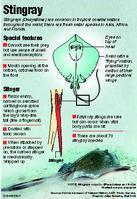Daraine Luton, Staff Reporter

IRWIN
DAYS AFTER the death of Australian conservationist Steve Irwin, after a stingray's barb pierced his heart, word has come from local experts that the sea creature is not dangerous.
Irwin, a world famous crocodile hunter, died Monday after being stung in the chest by a stingray while filming on Queensland's Great Barrier Reef in Australia.
Dr. Karl Aiken, lecturer in the department of Zoology at the University of the West Indies (UWI), Mona, has said stingrays are not dangerous.
Fatalities rare
A USA Today report suggested that stingray fatalities are rare: worldwide estimates range from 17 deaths since 1860 to about 30 over the past few years.
Stingrays, according to Dr. Aiken, are found in tropical countries such as Jamaica. However, the lecturer of marine science has said that in his more then 30 years in fish biology, he has only seen a few dozen in local waters.
"They are very rare. You will only find them in places where people don't visit often," Dr. Aiken said about the creature he described as "very gentle".
Caribbean countries such as Jamaica, Antigua and the Cayman Islands have stingray attractions. The James Bond Beach Hotel in Jamaica has a Stingray City which has been in operation since May 1 this year.
"They are absolutely gracious creatures," Ms Orine Irving, Guest Coordinator at Stingray City told The Gleaner yesterday.
Ms Irving added that as long as people swimming with the stingrays follow the safety instructions of the guides, they need not worry about attacks.
Self-defence

Dr. Aiken has stressed that stingrays do not attack people. Rather, he said, they act in self-defence. Pointing out that stingrays normally bury themselves under the sand close to unmolested shores, Dr. Aiken has suggested that people concerned about the creature learn the 'stingray shuffle'.
The 'stingray shuffle' involves keeping the legs close together and dragging them along the floor until you are well into the water. Stingrays, according to Dr. Aiken will only strike if they notice a shadow above them.
If you are stung by a stingray, hot water on the surface is the best first aid medicine. High temperature, according to Dr. Aiken, helps to nullify the effect of the poison pumped into the body by the stingray's venom-coated barb.

